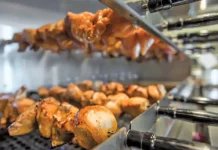
About a year ago I informed those of you who stop at this space that there was legislation pending in San Francisco which would contain requirements that up until now have been a managerial decision. The legislation was passed, and is also the law of the land in Seattle, Washington. Its title is the “Retail Workers Bill of Rights.”
I should also tell you that both of these cities were active in the $15 an hour minimum wage issue, as was the Service Employees International Union (SEIU).
At that time I also informed you that Javier Gonzalez, director of government affairs (San Jose) for the California Restaurant Association’s government affairs and public policy, made the following observation: “For operators, it would be a lot more challenging to schedule their employees with all of these requirements. The record requirements would be a huge burden, and also slow down the hiring process.”
His next statement was exactly why I brought this issue to your attention then and again now. “Gonzalez added that he was concerned that other cities may attempt to copy San Francisco if the legislation is successful. ‘There is a chance we could see this come up in other cities in California as well as major cities around the country.’ ”
That’s exactly what happened in Seattle, Washington, and similar legislation is pending in the nation’s capital, Washington, DC.
The following is a laundry list of what covered owners have to do:
- Give the city access on demand to payroll and employment records. Offer more hours to part-time employees before hiring additional employees or using employment agencies, if the part-time employees are qualified to do the work and have been performing similar work for the business. The offers of additional hours must be done in writing. Businesses are required to offer only enough hours to give the part-time employee eight hours a day or a 40-hour week.
- Require employers to pay employees for any shift cancelled with fewer than 24 hours’ notice.
- Retain employees who have worked for the business for at least six months, for a minimum of 90 days if the business is sold.
- Maintain a series of records, including written offers of more hours to employees, offers of employment to existing employees following a sale of the business, and a list of all employees who worked at the time the business was sold. Records must be kept for four years.
While I have never read a Service Employees International Union contract, I assume it contains similar language. I believe that the San Francisco law covers chains with more than 11 locations and 20 or more employees.
As for Seattle, the story is much different. “A survey of 700 restaurant employees taken by the Seattle Restaurant Alliance reveals most workers in the restaurant industry are happy with their working conditions and don’t think new laws restricting scheduling are needed,” as reported by Erin Shannon of the Washington Policy Center.
According to the survey: 89% say they can talk to their manager and give input about their environment, number of hours, and scheduling needs; 76% work the number of hours they want; and 86% of Seattle workers are proud to work in the industry.
The Washington Policy Center also reported about workers in San Francisco, where restrictive scheduling laws took effect last year, and warn of unintended consequences.
Many complain they lose out on opportunities to work extra hours because the “predictability pay” penalties discourage employers from offering extra shifts on short notice, even when workers would be happy for the chance to pick up such last-minute hours.
As I said 14 months ago, it is also another attempt to, first, burden the multi-unit businesses and—if history is any forecaster of the future—eventually, the industry at large. It is also indicative of the SEIU’s long reach in efforts to organize the retail industry, including food service. Why not? After all, we are becoming more and more service oriented and the growth of multi-unit food establishments is expanding at a prodigious rate.
As Willie Sutton, the most successful bank robber of all time is purported to have said when asked, “Why do you rob banks?” His answer: “That’s where the money is.” Why is the SEIU going after restaurant workers? That’s where most of the new hires are, and there are 14 million of them.























